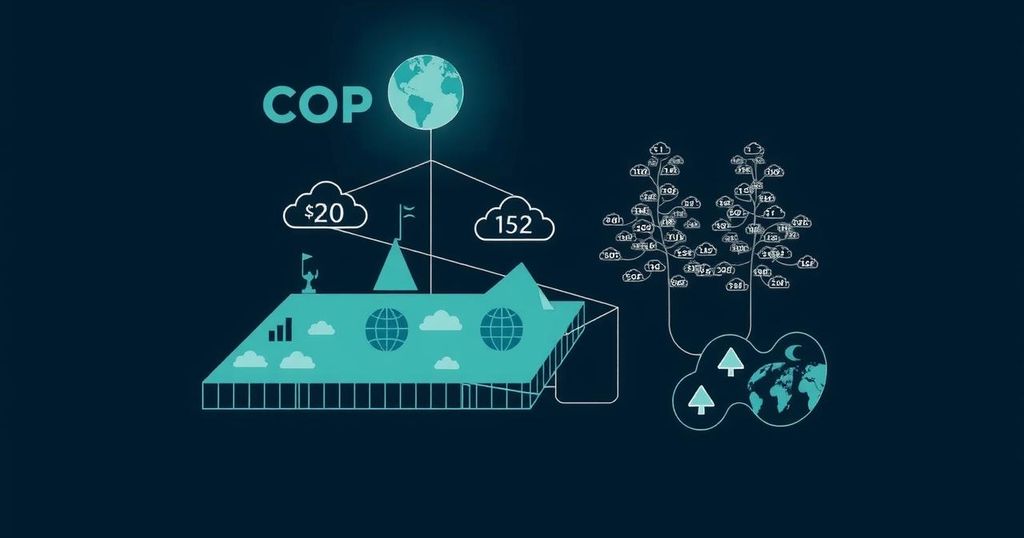COP29 in Baku has highlighted the urgent need for climate financing as essential to achieving climate goals. Key discussions focus on the NCQG and the contentious $100 billion annual funding target, with projections suggesting a requirement of $1 trillion annually by 2030. Solutions like solidarity levies have been proposed, but geopolitical challenges complicate commitments. The conference must focus on creating robust financial mechanisms to foster effective climate action.
As COP29 in Baku concludes its first week, the essential need for enhanced climate financing has emerged as a pressing issue within international discussions. The conference illustrates that achieving our climate objectives necessitates not only political commitment but also substantial financial mobilization. Central to the dialogue is the New Collective Quantifiable Goal (NCQG), which aims to address the increasing demands for climate financial resources, loss and damage compensation, and adaptation assistance. A contentious focal point remains the $100 billion yearly climate finance target established by the Copenhagen Accord, which was reported as surpassed in 2022, attracting skepticism from developing nations regarding the authenticity and calculation methods of this funding. Predictions from the Independent High-Level Group on Climate Finance project a requirement of $1 trillion annually by 2030, excluding China. Such forecasts underline the critical nature of timely financial interventions to mitigate escalating climate impacts. Early dialogues have introduced strategic solutions, including solidarity levies on harmful activities, which could potentially yield between $200 to $400 billion yearly. However, a notable shift towards investment-based financing, as opposed to traditional grant support, signals a prioritization of economic return over altruistic funding. The intricate geopolitical environment, with leaders from key nations absent at COP29, further complicates the discussions surrounding commitment to climate financing initiatives. Despite these challenges, significant advancements have been made, including the launch of the Global Energy Storage and Grids Pledge, aiming for a substantial increase in global energy storage and grid infrastructure by 2030. Additionally, the Hydrogen Action Declaration emphasizes collaborative efforts to enhance green hydrogen production, setting expectations for international partnerships ahead of COP30. Yet, the financial hurdles remain daunting. Norway’s warning about the implications of an annual $1 trillion expenditure provides insight into the scale of the challenge, illustrating the need for innovative financing strategies. The estimated costs of inaction highlight the urgency of swift, decisive action. If current mitigation costs seem high, the future financial burdens due to climate change could be exponentially greater. The perils of a missed opportunity at COP29 echo loudly, as the absence of a unified financial framework could diminish trust in the climate negotiation process. In conclusion, as COP29 advances into its critical second week, the necessity for a detailed financial roadmap cannot be overstressed. The efficacy of COP29 will be gauged not only by the aspiration of its emissions targets but significantly by the legitimacy and execution of its financing mechanisms. With climate change being an urgent global crisis, it is paramount that leaders act resolutely to establish funding solutions that reflect the gravity of the situation and allow for meaningful steps to be taken towards reducing emissions. A proactive approach is vital, as the costs of inaction are simply too prohibitive to ignore.
The 29th United Nations Climate Change Conference, known as COP29, serves as a platform for global stakeholders to collaborate and confront climate challenges. This year’s assembly is marked by increased discussions surrounding the financial frameworks necessary for combating climate change effectively. With a focus on climate financing mechanisms, the conference seeks to address the growing fiscal demands for adaptation efforts, loss and damage compensation, and sustainable investments.
COP29’s proceedings thus far have revealed critical financial dilemmas that must be resolved to facilitate successful climate actions on a global scale. The evolving landscape indicates a necessity for innovative financing methods and cohesive international collaboration to meet the ambitious climate targets set forth. The next phase of negotiations must prioritize actionable commitments and tangible financing frameworks to address the ongoing climate crisis effectively.
Original Source: www.forbes.com







